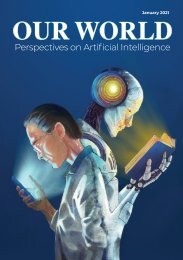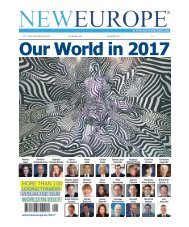Our World in 2018
Leading minds reflect on the state of our societies, and examine the challenges that lie ahead. An edition dedicated to generating ideas that will help form a new vision for our world.
Leading minds reflect on the state of our societies, and examine the challenges that lie ahead. An edition dedicated to generating ideas that will help form a new vision for our world.
Create successful ePaper yourself
Turn your PDF publications into a flip-book with our unique Google optimized e-Paper software.
SCIENCE & TECHNOLOGY
rooted in human rights commitments.
Genuine elections are essential
for people to express their
political will, but elections
cannot guarantee democratic
governance. This will be even more
true as digital technology advances.
It’s essential that we manage
these changes within the broader
framework of strengthening our
commitment to human rights and
democracy — not to threaten selfgovernance,
but rather to safeguard it.
This means improving systems
for inclusive and effective political
participation, including full and
easy (or even automatic) access to
voter registration processes and
.T
especially critical for groups that have
faced obstacles to full participation,
including women, racial and ethnic
minorities, indigenous persons, the
elderly, the disabled and those living
in extreme poverty.
Transparency in elections and
political processes is needed to build
.
must be able to freely examine key
information about governance and
about electoral processes and results.
For example, in the United States,
voting technologies should include
AYMAN OGHANNA/THE NEW YORK TIMES.
BRYAN DENTON/THE NEW YORK TIMES.
paper trails that can be audited;
there should be fewer barriers to
independent nonpartisan observers;
and the results of audits and reviews
should be readily available to the
public.
Effective voter participation in
governance and policy making in
the digital era will require additional
protections for rights and freedoms
such as freedom of expression and
association and access to information
— including the internet. Citizens will
need better tools to assess the quality
and accuracy of information, such as
fact-checking apps that crosscheck
information against recognized
sources and databases.
We must also develop legal
frameworks and technological
systems that protect privacy and the
security of our personal information,
with processes for independent
oversight. People must be able to
learn what data is being gathered
about them and who has access to it.
We must understand how all of
this information is being used by
media, corporations, governments
and others to shape political views
and behavior, and develop and
implement standards and codes of
practice to ensure that this does not
undermine our common principles.
In these and other challenges, the
enduring principles of democracy and
human rights must be our guiding
lights, or the digital future could be
dark indeed.
TYLER HICKS/THE NEW YORK TIMES.
OUR WORLD | 2018
© 2018 Jimmy Carter. Distributed by The New York Times Syndicate
67










